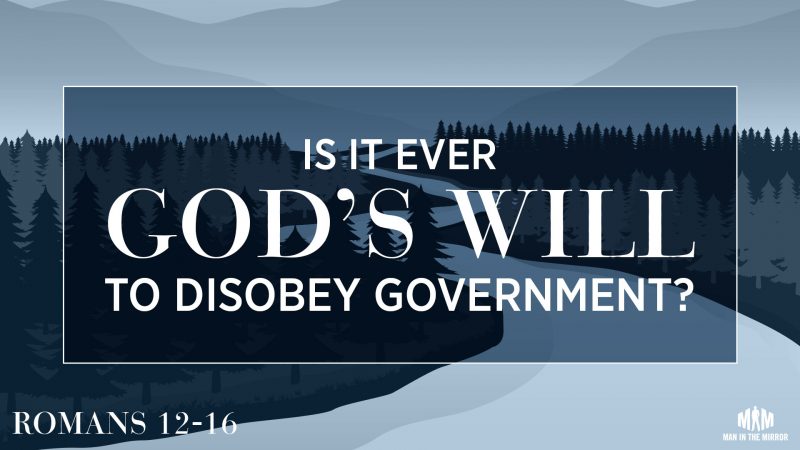Is It Ever God’s Will to Disobey Government?
Trash-talking government is popular sport, but is that biblical? Governments are God’s servants for your good. Are you confident or confused about your duty as a citizen? For example, what should you do when the government doesn’t do its duty? Are there boundaries you should not cross?
Tune in and let Patrick Morley help you think through your duty as a believer, the duty of government, and what to do when the government is in conflict with God. Join us! If you’re not already in a group, invite some men to watch the video and discuss the downloadable questions together. We will always be stronger together.
Verses referenced in this lesson:
Romans 13:1-7
Below you’ll find options for downloads including a handout for the lesson (.pdf), a full transcript (.pdf), an audio-only version of the lesson (.mp3), and a full video of the lesson (.mp4). To save them, right-click and select “Save link as…”
ROMANS 12-16:
Putting Your Faith into Action
Is It Ever God’s Will to Disobey Government?
Rough Transcript
Patrick Morley
Patrick Morley:
Hello, men, and welcome to the Man in the Mirror Bible Study. I’m Pat Morley. Today, we’re going to be talking about the topic, Is It Ever God’s Will to Disobey Government? We are in the series, Putting Your Faith Into Action, the last of four parts of the book of Romans. Please turn in your Bibles to Romans 13:1.
Trash-talking government is a very popular sport these days, and there are a lot of problems that we do face, but over the last couple of years, I’ve been making the list of all the benefits of government, and I’ve been so excited for an opportunity to talk about them, and so I’m going to read you some of the benefits of government. The passage we’re talking about today deals with our duty as citizens in government, so just think about some of these benefits as I run through them, Food and Drug Administration, USDA, agriculture, protection of food supply, potable water, wastewater treatment, power grids, CDC, EPA, FEMA, NHTSA, transportation, the black box group, standards for prescription drugs, air traffic controllers, customs inspection of goods, passports, green cards, regulation of immigration, protection of the Homeland, embassies, military. It’s overwhelming, isn’t it? Interstate highway system, other roads, geological survey, Bureau of Land Management, Post Office, national parks, Medicare, Medicaid, Social Security, regulation of banking and investments, environmental protection. We talked about that, banking regulation, FDIC, Securities and Exchange Commission, blood supply, National Weather Service, National Hurricane Center, federal justice system, criminal justice system, police forces, airports, harbors, shipping regulations, forest fires, building codes, zoning laws.
Are we perfect? Of course, we’re not perfect. Are we flawed? Yes, of course we’re flawed, but there is so much good going on, and the tendency is to do so much trash-talking, that sometimes that narrative gets very distorted, so today, we’re going to look at this topic about our role as citizens. We’re going to begin by looking at the duty of a believer.
THE DUTY OF A BELIEVER
This was the first thing the duty of a believer, and you should be Romans 13:1. Let’s read together. “Let everyone be subject to the governing authorities, for there is no authority except that which God has established. The authorities that exist have been established by God.” Down in verse five, and we’ll come back to these other verses, two, three, and four, “Therefore, it is necessary to submit to the authorities, not only because of possible punishment, but also as a matter of conscience.”
We study God as Creator, Sustainer and Redeemer. Much of what we talk about in the Bible study deals with God and His role as Redeemer. This passage today has nothing to do directly with God’s role as Redeemer. It has everything to do with God’s role as Sustainer, so there’s no soteriological implication here, no discussion of how salvation comes about, it’s all cosmological. It’s all about our life here together, live together here on earth. God has given us three major institutions for sustaining our lives, the family, the Church and governments, and this is the signature passage on governments.
Abraham Kuyper was the Prime Minister of the Netherlands. He’s also started a newspaper, a number of Christian schools. He was a scholar, he was a pastor, he was a theologian. There is actually a college called Kuyper College, K-U-Y-P-E-R, and there’s a section of Princeton Theological Seminary, where you can study Abraham Kuyper. He was one of the men who best articulated the concept of the sovereignty of God over all of creation, that God, that Jesus Christ is Lord of all.
He famously said, “There is not a square inch in the whole domain of human existence over which Christ, who is Sovereign over all, does not cry, ‘Mine!'” This is the part of the scripture where we deal with that sovereignty being delegated to governments. Verse two, “Consequently, whoever rebels against the authority is rebelling against what God has instituted, and those who do so will bring judgment on themselves. For rulers hold no terror for those who do right,” excuse me, “But for those who do wrong. Do you want to be free from fear of the one in authority?”
“Then do what is right and you will be commended. For the one in authority is God’s servant for your good, but if you do wrong, be afraid, for rulers do not bear the sword for no reason. They are God’s servants, agents of wrath to bring punishment on the wrongdoer,” so who should fear government? At verse three, those who do wrong. There’s no need to fear government if you’re not doing wrong.
It says then, “Do what is right, and you will be commended.” What are those things to do what is right? We’ve already read verse five. Down in verse six, “This is why you pay taxes, for the authorities are God’s servants, who give their full time to governing. Give to everyone what you owe them, if you owe taxes, taxes, pay taxes, if revenue, then revenue, if respect, then respect, if honor, then honor.”
This is the duty of a citizen, a believer as a citizen. It’s to submit, and four examples are given here. It’s not the comprehensive list. It’s a representative list, but it’s a good list, taxes, revenue, respect and honor. This word, submit in verse five and the word, subject in verse one are both the same word.
It’s hupotasso. It’s the Greek word. It’s the same word when … In Ephesians 5, it says, “Wives be subject or be in submission to your husbands,” so the idea here is to, that there’s an authority structure and that we are to be subject to it. Well, why? Why should we do this?
My wife and I love to go camping. Every campground has campground rules. It would be utter chaos if the campground didn’t have rules. For example, what if the campground didn’t have a checkout time, so people could just leave whenever they want. They could stay to the very end of the day.
Well, what about the person who’s supposed to be checking in that day? What about having no regulations on when loud music could be played or not played, or quiet hours, or when you could run generators, or where on the property you could park, and can you park on areas where the vegetation is endangered? There are so many reasons why rules in an authority structure are important. Another example, just think about, take the busiest intersection in your city. Imagine if that traffic light was completely removed, and then people could just do whatever they want at that intersection.
If there was no government, if there was no regulation over that, it would be chaos, so we need government to bring order out of the chaos and smooth things over. Well, what about when the government’s doing what is immoral or against what God commands or prohibits? A good example of that would be when the Pharaoh told the two Hebrew midwives, if you’re familiar with the story, the Pharaoh told two Hebrew midwives that they should kill all of the male babies, Hebrew babies that were being born. Well, the two midwives didn’t obey the government. Instead, they delivered those babies.
The Pharaoh called the two women before him and said, “Why have you disobeyed me?,” and they lied. They said, “Well, these Hebrew women, they’re really quick. They have their babies really fast.” R. C. Sproul, my lead, I would say lead Professor at Reformed Theological Seminary, where I attended, he used to say, “You only owe the truth to whom the truth is due,” so those Hebrew midwives did not owe the truth to a Pharaoh who was doing evil. Now, I’m going to come to the Big Idea for the day, and the Big Idea is; Submit whether you agree or not, unless you would have to violate what God commands or prohibits. Submit whether you agree or not.
It’s not important whether you agree with a particular law, whether you agree that the traffic light should be regulated so that there’s no tripwire, and you have to wait three minutes even if no other cars are coming from any direction. You still have to wait. You may not agree with that, but you do have a responsibility as a believer to submit to the governing authorities. Submit whether you agree or not, unless you would have to violate what God commands or prohibits. God prohibits in the 10 Commandments murder, and so the Hebrew midwives didn’t do it.
That has … It’s a little bit of an overview of the duty of a believer.
THE DUTY OF GOVERNMENT
Next, we want to look at the duty of government, and we see that, again in verse four, “For the one in authority is God’s servant for your good.” Some say, and I’m sure you’ve heard it said, perhaps you’ve said it yourself, “You can’t legislate morality.” That’s crazy.
Of course, you can legislate morality. We legislate that you can’t murder people, you can’t rob banks, you can’t do certain kinds of harassing behaviors. Of course, we can legislate morality. I think what people mean when they say that is that you can’t legislate moral behavior, and you can’t do that, but governments are set up for our good to set up the boundaries of moral behavior, of good behavior. Also, of course, governments are involved in setting priorities, and again, you don’t have to agree with them, but the duty of the believer is to submit whether you agree or not, unless you would have to violate what God commands or prohibits.
Now, you might wonder, “Why is Paul in this text so unilaterally in favor of being a good citizen?” We have to remember the context, Paul himself is not submitting to the government, which is telling him that he can’t preach the gospel. In fact, he’s being imprisoned over and over again for that, so we know that that, submitting to the governing authorities doesn’t mean that you violate what God commands or prohibits. Also, we have the examples of Peter and John, who in Acts 4 were arrested. They were arrested for preaching the gospel, and somewhere here, I’ve got a copy of the verse I want to read to you.
Here it is. They were arrested, and then they were called before the religious leaders, and they said, “Why are you doing this?,” and, “Don’t ever do it again.” Peter and John replied, “Do you think God wants us to obey you rather than Him? We cannot stop telling about everything we have seen and heard.” Then, guess what?
They got arrested again for doing the same thing. The leader said, “Didn’t we tell you never to teach again in this Man’s name?,” but Peter and the apostles replied, “We must obey God rather than any human authority,” so there is a balancing act here, and the idea is that we need to be a good citizen. We need to submit, whether we agree or not, unless we would have to violate what God commands or prohibits, and so that brings us to other examples, Daniel, who was told that he needed to pray only to the king, and he didn’t. He went right back upstairs and prayed to God, as he always did. He was thrown into the den of lions for that.
Shadrach, Meshach and Abednego did not bow down to the idol that Nebuchadnezzar had erected. He said, “I’m going to give you one more chance.” They said, “Oh, king, we want you to know that we’re never going to bow down to this idol, and even if you do throw us into the fire and we die, that’s fine, but we want you to understand we will never bow down to your idol,” and of course, God preserved their lives. The Big Idea today, submit whether you agree or not, unless you would have to violate what God commands or prohibits. God commands us to share our faith.
He prohibits us from violating the 10 Commandments and the Golden Rule.
WHEN GOVERNMENT CONFLICTS WITH GOD
Final thing here today, when government conflicts with God, you always want to be a person who lives by the pledge of a good conscience. Sometimes your conscience is violated. You do believe that the government is doing something that is not biblical, when you do engage in civil disobedience like the Hebrew midwives, or Peter, Paul, John, Daniel, Shadrach, Meshach, Abednego. When you do participate in civil disobedience, the theme is always that it is not violent.
Not violent. We saw that with Rosa Parks. We saw that with Martin Luther King. Sometimes in very rare instances, governments are so egregiously evil, that there is a place for violence, a just kind of violence. Think of the confessing Church, the confessing pastors in Nazi, Germany, who planned the assassination, the failed assassination of Hitler.
They believed, as a matter of conscience, that a line of boundary had been crossed, but more appropriate would be the example of William Wilberforce. 100 years before Abraham Lincoln took on the cause of slavery in England in 1780, William Wilberforce at the age of 21, a Cambridge graduate, a man of privilege and pretty frivolous, matter of fact, was elected to the Parliament. He traveled the continental part of Europe with his former headmaster at Hull, H-U-L-L, and his headmaster took William Wilberforce under his wing, helped him understand the gospel, and then discipled him on what it meant to be a believer in the world. William Wilberforce pondered this and he wondered, “Am I a Christian only to be saved or should I be doing something here and now?” He came to the conclusion that it’s not enough to be saved, but we must also serve.
William Wilberforce saw that slavery had engulfed the economy of England. The plantations in the Caribbean were being populated by human beings who were sold as property. It was a huge industry, 5,000 sailors, 160 ships, thousands and tens of thousands of human beings, many of whom died in these slave ships. It was a wicked and an evil thing that the government was participating and enabling. Wilberforce devoted his life as a Christian to the abolition of slavery.
It took him 20 years to have the slave trade abolished 20 years, bringing it up every year in Parliament, and then another 25 years to have slavery abolished in England, 45 years of his life. When government conflicts with God, do your part. Get involved, but remember that the Big Idea today, that you should do that while you’re submitting to the government. Submit whether you agree or not, unless you’d have to violate what God commands or prohibits. Let us pray.
Our dearest Father, thank You for Your Holy Word that shows us our duty as citizens when governments do good, and also gives us examples of civil disobedience when governments don’t do good. Lord, we pray that each of us would reevaluate how we talk about government, our attitude about government, that we would rather be part of the solution than part of the problem, that you would give us wisdom, Lord, to submit to the governing authorities and to do it with a grateful heart and when we feel like we need to protest or demonstrate, that we would always do it in the context of all the good the government does as well, Your institution, and we ask this in Jesus’ name. Amen. Thank you, men.



